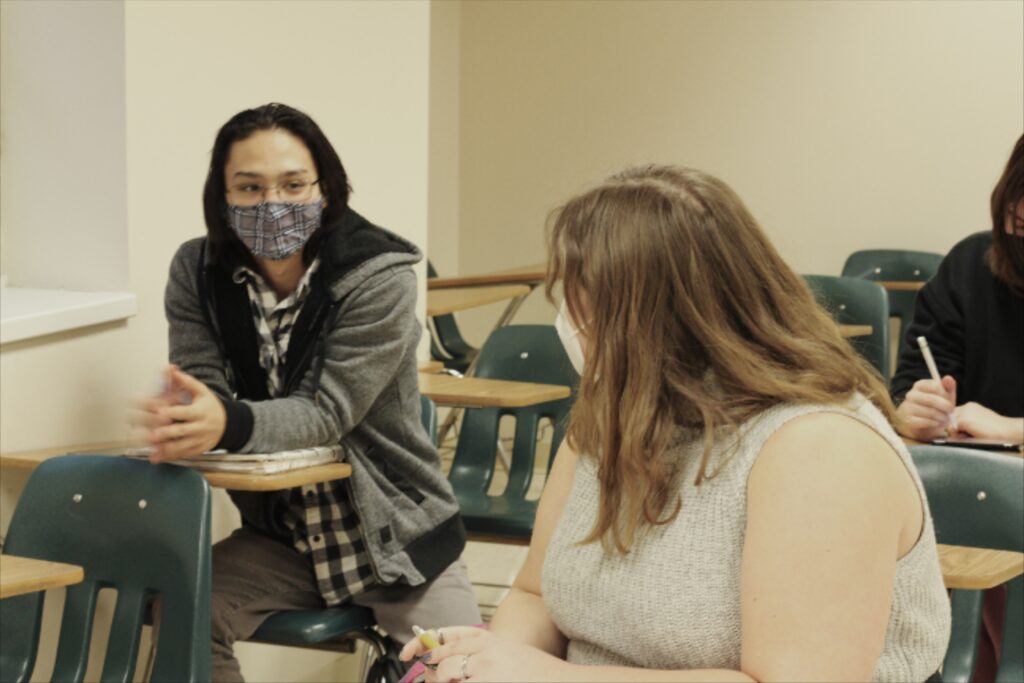Virginia Attorney General’s opinion states universities may not require COVID-19 vaccines, UMW lifts mandate
3 min read
After the new mandates, some students are concerned with the new policies that allow professors to be unvaccinated. | Naomi Jones / The Weekly Ringer
by JOSEPHINE JOHNSON
News Editor
On Jan. 26, Virginia Attorney General Jason Miyares issued an executive opinion at the request of Gov. Glenn Youngkin. The opinion stated that, “absent specific authority conferred by the General Assembly, public institutions of higher education in Virginia may not require vaccination against COVID-19 as a general condition of students’ enrollment or in-person attendance.” This is in direct contrast to the university’s previous policy that all students, faculty and staff must be fully vaccinated against COVID-19 with a booster shot, and UMW has since revised its vaccine requirement as a result.
Students received an email from Lisa Marvashti, signed by the Office of The President, on Jan. 31, informing them that, after reviewing the executive opinion, UMW will no longer be requiring proof of vaccination for students attending classes in person. Unvaccinated students or students without the booster vaccine will not be required to test any more than fully vaccinated students.
“UMW continues to strongly encourage students and employees to get vaccinated/boosted as soon as they are eligible, and we strongly encourage them to upload their information when they do so at the designated survey locations,” said University President Troy Paino in the email sent out on Jan. 31.
Nevertheless, the majority of UMW students are at least partially vaccinated.
“Fortunately, approximately 95% of the UMW community is vaccinated, making this an incredibly safe place to live, learn and work,” said Paino in an interview. “If you’re vaccinated, your chances of getting severely sick are extremely low. The vast majority of our students are boosted, and for now we still require masks inside.”
Paino also reassured students who may be concerned by the lifting of the vaccine mandate.
“Dr. Joseph Allen, a COVID and ventilation expert at Harvard, recently stated that being vaccinated, boosted and wearing a well-fitted N95 or similar mask indoors puts you at ‘extremely low’ risk,” said Paino. “In fact, he said ‘there’s not much else in life that would have as low a risk as that.’ While the risk is not zero, an impossible and impractical standard to meet, and those who are immunocompromised have to be more careful, individuals on campus now have the tools at their disposal to remain safe no matter what others are doing.”
The City of Fredericksburg has 5,196 confirmed cases as of Feb. 9, according to The Weather Channel’s COVID-19 case website. UMW has 203 cumulative reported cases this semester as of Feb. , according to the university’s COVID-19 dashboard. In the fall 2021 semester, UMW reported a total of 128 COVID cases from Aug. 1 to Dec. 31.
“I don’t appreciate [the new COVID regulations] because I live with high-risk family members and I’d like to believe that I’m not taking COVID home, but there’s no way to be sure,” said Addy Reeher, a junior communication and digital studies major. Reeher noted that because the Attorney General issued this opinion, “it puts the schools in a very difficult position.”
Reeher, a resident of Eagle Landing, is concerned that some residents do not wear masks in the building.
“There are a lot of students who are unvaccinated for whatever reason and that worries me because they’re not getting weekly tests, especially because people in Eagle Landing don’t wear masks,” she said.
Junior sociology major Megan Mercuro also wishes the university could maintain its vaccine mandate.
“Personally, I think the school should’ve kept the vaccine mandate, especially with the new highly contagious strain omicron,” said Mercuro. “By keeping the mandate we are not only protecting ourselves but other students and faculty who may be at high risk. We are also preventing the school from having another fully Zoom semester.”
Moving forward, Paino hopes to work through mental health problems amplified by COVID.
“The availability of the vaccine and booster has significantly reduced the risk posed by the omicron variant, so we must now focus more on the mental health problems associated with organizing our lives around COVID,” he said. “More human interaction will go a long way in addressing those problems, so I look to our future with great hope and enthusiasm.”


